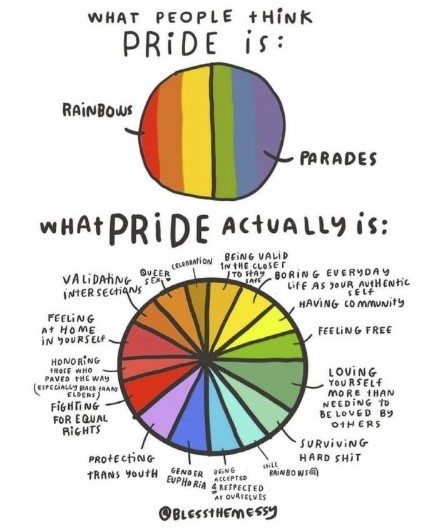Do you identify as lesbian, gay, bisexual, or transgender? If so, you’re part of the LGBT community. This post unpacks the meaning and origin of this initialism.
Meaning
The initialism ‘LGBT’ stands for ‘Lesbian, Gay, Bisexual, Transgender.’ It’s an inclusive term describing people from alternate sexual identities. ‘LGBT’ encompasses the entire range of alternate sexual identities, but it’s a little outdated. The current version of the initialism is ‘LGBTQI+.’
However, many people use ‘LGBT,’ and it’s well recognized as the global standard for including all alternate sexual identities. ‘LGBT’ acts as an umbrella term for all alternative gender identities. If you use ‘LGBT,’ you’re either describing the entire community or using it to avoid offending someone because you don’t know their exact sexual identity.
Example Usage
"I heard that Tim came out of the closet. He's now part of the LGBT community and finally living the life he wants, free of condemnation and suppression."
"LGBT people claim they have to deal with people suppressing them and their sexual identity. Why do you think they are so wound up about what sex they identify with?"
"I'm part of the LGBT community. I stand up for people's right to identify with any sexuality they want. There's no reason to suppress people's sexual; identity. This is the 21st century, after all."
"The LGBT community keeps inventing new sexual identities all the time. It's hard to keep up. Can someone explain what a 'demi boy' is to me?"
"This is unacceptable. You're a bigot if you don't support the LGBT community. Make sure you fly the pride flag outside your corporate headquarters, or we'll organize a protest on your doorstep."
"I'm transgender and part of the LGBT community. I had to live in fear my whole life until I moved to California. At least people out here accept me for who I am."
"The LGBT community is serious about their sexuality. God help you if you address them with the wrong identity or incorrect pronouns."
"The LGBT community is a big part of cancel culture. If you say anything against them, they'll try to take you out of the game. Just look at Dave Chapelle."

Origin
The initialism ‘LGBT’ originates from the alternative sexual revolution in the late 1980s. Activists first coined the term in the United States in 1988. Until the 1990s, a stigma was attached to being ‘LGBT’ or any other sexual identity other than straight. However, the relentless campaigning of these activists led to the widespread acceptance of LGBT people.
‘LGBT’ is an inclusive term originally meant to gather all counter-sexual identities under one umbrella. The initialism changes over the following decades to include other sexual identities, such as ‘queer.’ While ‘LGBTQI+’ is now the preferred initialism, ‘LGBT’ is still a common reference encompassing all non-straight sexual identities.
Phrases Similar to LGBT
- LGBTQ+
- Lesbian.
- Gay.
- Bisexual.
- Transgender.
- Sexual identity.
- Pride.
Phrases Opposite to LGBT
- Straight.
What is the Correct Saying?
- LGBT.
Ways People May Say LGBT Incorrectly
The term 'LGBT' is outdated and replaced with the more current 'LGBTQ+' to include the other sexual identities created since 2015. Using 'LGBT' shows that you don't keep up with current trends in this community, and some people may find this offensive.
Acceptable Ways to Phrase LGBT
You can use 'LGBT' when referring to lesbian, gay, bisexual, and transgender people. It's a flexible term describing many different sexual identities. However, they all have the commonality of separating them from the straight or heterosexual identity. You can use LGBT in professional or social conversations to refer to a person's sexual identity.
'LGBT' is a choice, not a birthright, and people that identify as LGBT take their sexual identity seriously. Most LGBT people behave as if their sexual identity is more important than their personality, forming their identity framework. When asking someone about their sexual identity, you can use 'LGBT' as a broad definition, asking them about their sexual identity.
